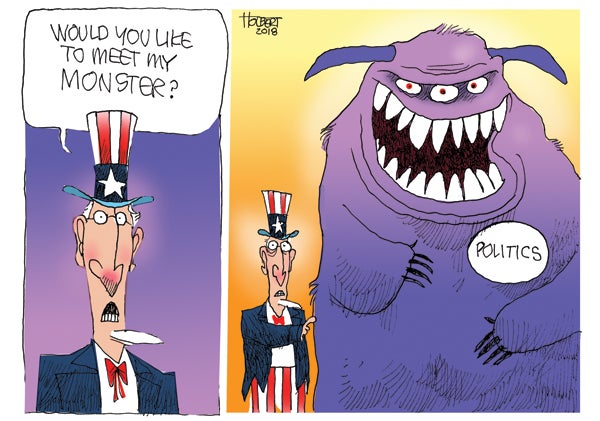The party, not the tribe, enforces political division
Published 10:45 pm Wednesday, October 24, 2018
By Cass Sunstein
Bloomberg Opinion
With respect to politics, many people think and act as if the forces of light are assembled against the forces of darkness, and the only serious question is this: What side are you on?
“Hidden Tribes: A Study of America’s Polarized Landscape” offers an optimistic perspective on how the U.S. might get past that question. Produced by More in Common, an international initiative seeking to reduce social divisions, the report describes seven American “tribes.”
The perspective is illuminating. Unfortunately, the political backdrop, and the dominant role of political parties, mean that it will be difficult to transcend current divisions — whatever people say in response to surveys.
The authors of the report identify the seven tribes through a battery of questions, surveying Americans about their attitudes. The questions ask about group identity, meaning the extent to which people identify with different social groups on the basis of nationality, ethnicity, gender and other factors; their belief in personal agency, meaning the extent to which they think people succeed as a result of luck, or instead their own hard work; the moral foundations of their judgments and several other items.
The report finds a major source of polarization. About 14 percent of Americans fall within the most extreme categories on the left and the right: Progressive Activists (8 percent) and Devoted Conservatives (6 percent). The two groups live in different political universes. They differ on facts, and they differ on values. Both groups are angry.
Nearly all Progressive Activists agree that “immigration is good for America.” About 90 percent of Devoted Conservatives think “immigration nowadays is bad for America.”
More than 90 percent of Progressive Activists agree that “sexual harassment is commonplace nowadays.” Nearly 90 percent of Devoted Conservatives disagree with that statement.
Nearly all Progressive Activists agree that “many white people today don’t recognize the real advantages they have.” Only 18 percent of Devoted Conservatives agree with that statement; more than 80 percent of them think that “white people do not have any real advantages over others.”
For Progressive Activists, climate change and inequality are leading priorities. For Devoted Conservatives, immigration and terrorism top the list.
The “Hidden Tribes” report identifies five groups in the middle: Traditional Liberals (11 percent of Americans), Passive Liberals (15 percent), Politically Disengaged (26 percent), Moderates (15 percent) and Traditional Conservatives (19 percent).
On a wide range of issues, these groups line up from left to right. On immigration, sexual harassment and the advantages of white people, Passive Liberals, Politically Disengaged and Moderates show internal division, and sometimes a pretty even split. The authors of the “Hidden Tribes” report draw considerable comfort from these findings. They contend that these three groups, and also Traditional Liberals, favor political compromise and show ideological flexibility. Most members of the four groups believe that “the people I agree with politically need to be willing to listen to others and compromise.”
For that reason, the authors of the report end on an optimistic note: “The middle is far larger than conventional wisdom suggests, and the strident wings of progressivism and conservatism are far smaller.” Even better, they say, the United States has “a powerful story of national identity,” and that story “can be the force that unifies people” and so overcomes polarization.
That optimism might turn out to be justified. But there is a big problem: The catastrophic consequences of the contemporary party system — and the rise of “partyism.”
On many questions, Americans simply follow the views of their preferred party, even if their own policy views suggest that their party is wrong — “party over policy.” For example, most Republicans believe that man-made climate change is real. But after they learn that a policy response has been proposed by Democratic politicians, they become significantly less likely to support it.
Partyism means that Republicans show automatic hostility and aversion to Democrats, and vice versa. In recent decades, partyism has increased dramatically. It is one thing to say you favor compromise in the abstract; it is another thing to say that on gun control, abortion, climate change or immigration, you will favor compromise with a political party you despise.
Party discipline makes things even worse. It can be difficult for representatives to vote their convictions, even when their constituents want them to do so.
Most Americans are not zealots. They approach politics in a pragmatic spirit. They are willing to listen. But as it stands, the party system is the primary source of tribalism. It is working against them.


